Related Research Articles

Bavaria, officially the Free State of Bavaria, is a federal state in the south-east of Germany. With an area of 70,550.19 square kilometres (27,239.58 sq mi), Bavaria is the largest German state by land area, comprising roughly a fifth of the total land area of Germany. With over 13 million inhabitants, it is second in population only to North Rhine-Westphalia, but due to its large size it is one of the least densely populated states. Bavaria's main cities are Munich, Nuremberg, and Augsburg.

Louis IV, called the Bavarian, of the house of Wittelsbach, was King of the Romans from 1314, King of Italy from 1327, and Holy Roman Emperor from 1328.

The House of Wittelsbach is the Royal Bavarian dynasty from Germany, with branches that have ruled over territories including Bavaria, the Palatinate, Holland and Zeeland, Sweden, Hungary, Bohemia, the Electorate of Cologne and other prince-bishoprics, and Greece. Their ancestral lands of the Palatinate and Bavaria were Prince-electorates, as well as the Archbishopric-Electorate of Cologne, and the family had three of its members elected emperors and kings of the Holy Roman Empire. Their Kingdom of Bavaria was created in 1805 and continued to exist until 1918.
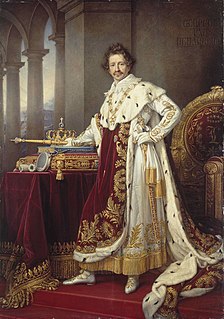
Ludwig I or Louis I was King of Bavaria from 1825 until the 1848 revolutions in the German states.

Maximilian I Joseph was Duke of Zweibrücken from 1795 to 1799, prince-elector of Bavaria from 1799 to 1806, then King of Bavaria from 1806 to 1825. He was a member of the House of Palatinate-Birkenfeld-Zweibrücken, a branch of the House of Wittelsbach.

The Reinheitsgebot is a series of regulations limiting the ingredients in beer in Germany and the states of the former Holy Roman Empire. The best known version of the law was adopted in Bavaria in 1516, but similar regulations predate the Bavarian order, and modern regulations also significantly differ from the 1516 Bavarian version. Although today, the Reinheitsgebot is mentioned in various texts about the history of beer, historically it was only applied in the duchy of Bavaria and from 1906 in Germany as a whole, and it had little or no impact in other countries or regions.

Ludwig III was the last King of Bavaria, reigning from 1913 to 1918. Initially he served in the Bavarian military as a lieutenant and going on to hold the rank of Oberleutnant during the Austro-Prussian War. He entered politics at the age of 18 becoming a member of the Bavarian Legislature and keen participant in politics, endorsing agricultural and voting reforms. Later in life he served as regent and de facto head of state from 1912 to 1913, ruling for his cousin, Otto. After the Bavarian parliament passed a law allowing him to do so, Ludwig deposed Otto and assumed the throne himself. He led Bavaria during World War I.
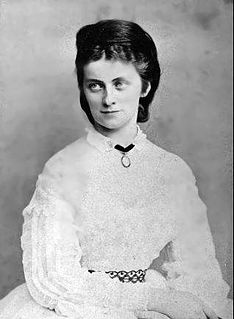
Duchess Sophie Charlotte Augustine in Bavaria was a granddaughter-in-law of King Louis Philippe of France, the favourite sister of Empress Elisabeth of Austria and fiancée of King Ludwig II of Bavaria.
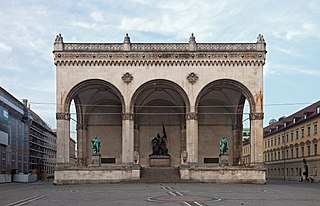
The Feldherrnhalle is a monumental loggia on the Odeonsplatz in Munich, Germany. Modelled after the Loggia dei Lanzi in Florence, it was commissioned in 1841 by King Ludwig I of Bavaria to honour the tradition of the Bavarian Army.

Luitpold Karl Joseph Wilhelm Ludwig, Prince Regent of Bavaria, was the de facto ruler of Bavaria from 1886 to 1912, due to the incapacity of his nephews, King Ludwig II for three days and King Otto for 26 years.

Bavaria is the name given to a monumental, bronze sand-cast 19th-century statue in Munich, southern Germany. It is a female personification of the Bavarian homeland, and by extension its strength and glory.

The Order of the Redeemer, also known as the Order of the Saviour, is an order of merit of Greece. The Order of the Redeemer is the oldest and highest decoration awarded by the modern Greek state.

The Kingdom of Bavaria was a German state that succeeded the former Electorate of Bavaria in 1805 and continued to exist until 1918. With the unification of Germany into the German Empire in 1871, the kingdom became a federated state of the new empire and was second in size, power, and wealth only to the leading state, the Kingdom of Prussia.
Louis the Strict was Duke of Upper Bavaria and Count Palatine of the Rhine from 1253. He is known as Louis II or Louis VI following an alternative numbering. Born in Heidelberg, he was a son of Otto II Wittelsbach, Duke of Bavaria and Agnes of the Palatinate.
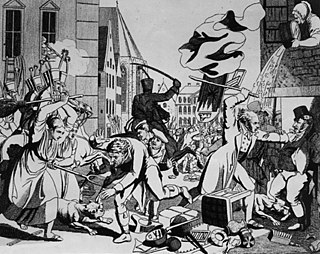
The Hep-Hep riots from August to October 1819 were pogroms against Ashkenazi Jews, beginning in the Kingdom of Bavaria, during the period of Jewish emancipation in the German Confederation. The antisemitic communal violence began on August 2, 1819 in Würzburg and soon reached the outer regions of the German Confederation. Many Jews were killed and much Jewish property was destroyed.
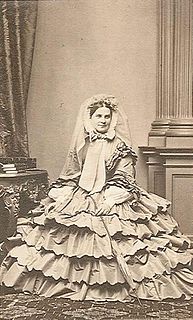
Princess Hildegard of Bavaria was the seventh child and fourth daughter of Ludwig I of Bavaria and Therese of Saxe-Hildburghausen.

Archduchess Auguste Ferdinande of Austria was the only daughter of Leopold II, Grand Duke of Tuscany and his first wife, Maria Anna of Saxony to survive to adulthood. She married Prince Luitpold of Bavaria, who later became the Prince Regent of Bavaria after her death.

Ludwig II was King of Bavaria from 1864 until his death in 1886. He is sometimes called the Swan King or der Märchenkönig. He also held the titles of Count Palatine of the Rhine, Duke of Bavaria, Duke of Franconia, and Duke in Swabia.
Corps Palatia is a fencing fraternity belonging to the Kösener Senioren-Convents-Verband, the oldest association of German and Austrian student corporations. It unites students of Munich's universities, most notably Ludwig-Maximilian University of Munich and the Technical University of Munich. Palatia's members are known as Pfälzer, which is derived from the Bavarian region of Upper Palatinate.
References
- ↑ Friedrich Engels wrote about the events for the Chartist newspaper Northern Star, on 25 May 1844.